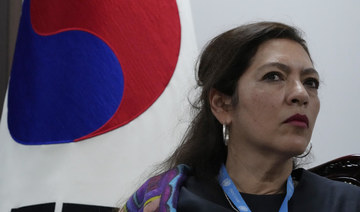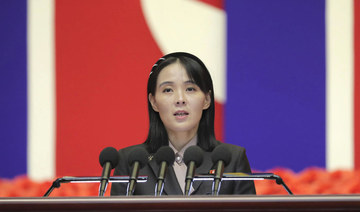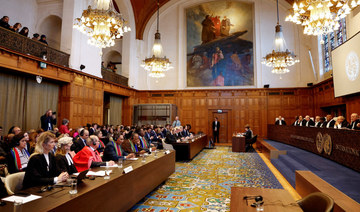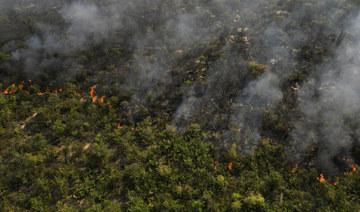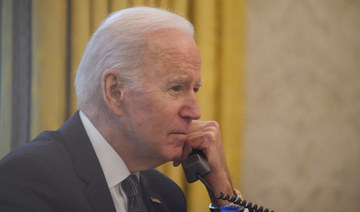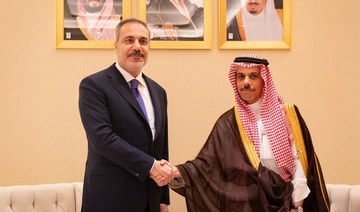SEOUL: North Korea has officially enshrined the right to use preemptive nuclear strikes to protect itself in a new law that leader Kim Jong Un said makes its nuclear status “irreversible” and bars denuclearization talks, state media reported on Friday.
The move comes as observers say North Korea appears to be preparing to resume nuclear testing for the first time since 2017, after historic summits with then-US President Donald Trump and other world leaders in 2018 failed to persuade Kim to abandon his weapons development.
The North’s rubber-stamp parliament, the Supreme People’s Assembly, passed the legislation on Thursday as a replacement to a 2013 law that first outlined the country’s nuclear status, according to state news agency KCNA.
“The utmost significance of legislating nuclear weapons policy is to draw an irretrievable line so that there can be no bargaining over our nuclear weapons,” Kim said in a speech to the assembly, adding that he would never surrender the weapons even if the country faced 100 years of sanctions.
Among the scenarios that could trigger a nuclear attack would be the threat of an imminent nuclear strike; if the country’s leadership, people or existence were under threat; or to gain the upper hand during a war, among other reasons.
A deputy at the assembly said the law would serve as a powerful legal guarantee for consolidating North Korea’s position as a nuclear weapons state and ensuring the “transparent, consistent and standard character” of its nuclear policy, KCNA reported.
“Actually spelling out the conditions for use are especially rare, and it may simply be a product of North Korea’s position, how much it values nuclear weapons, and how essential it sees them for its survival,” said Rob York, director for regional affairs at the Hawaii-based Pacific Forum.
The original 2013 law stipulated that North Korea could use nuclear weapons to repel invasion or attack from a hostile nuclear state and make retaliatory strikes.
The new law goes beyond that to allow for preemptive nuclear strikes if an imminent attack by weapons of mass destruction or against the country’s “strategic targets,” including its leadership, is detected.
“In a nutshell, there are some really vague and ambiguous circumstances in which North Korea is now saying it might use its nuclear weapons,” Chad O’Carroll, founder of the North Korea-tracking website NK News, said on Twitter.
“I imagine the purpose is to give US and South Korean military planners pause for thought over a much wider range of actions than before,” he added.
Like the earlier law, the new version vows not to threaten non-nuclear states with nuclear weapons unless they join with a nuclear-armed country to attack the North.
The new law adds, however, that it can launch a preemptive nuclear strike if it detects an imminent attack of any kind aimed at North Korea’s leadership and the command organization of its nuclear forces.
That is an apparent reference to South Korea’s “Kill Chain” strategy, which calls for preemptively striking North Korea’s nuclear infrastructure and command system if an imminent attack is suspected.
Kim cited Kill Chain, which is part of a three-pronged military strategy being boosted under new South Korean President Yoon Suk-yeol, as a sign that the situation is deteriorating and that Pyongyang must prepare for long-term tensions.
Under the law, Kim has “all decisive powers” over nuclear weapons, but if the command and control system is threatened, then nuclear weapons may be launched “automatically.”
If Kim delegates launch authority to lower commanders during a crisis, that could increase the chances of a catastrophic miscalculation, analysts said.
The law bans any sharing of nuclear arms or technology with other countries, and is aimed at reducing the danger of a nuclear war by preventing miscalculations among nuclear weapons states and misuse of nuclear weapons, KCNA reported.
Analysts say Kim’s goal is to win international acceptance of North Korea’s status as a “responsible nuclear state.”
US President Joe Biden’s administration has offered to talk to Kim any time, at any place, and Yoon has said his country would provide massive amounts of economic aid if Pyongyang began to give up its arsenal.
South Korea on Thursday offered to hold talks with North Korea on reunions of families separated by the 1950-53 Korean War, in its first direct overture under Yoon, despite strained cross-border ties.
North Korea has rebuffed those overtures, however, saying that the United States and its allies maintain “hostile policies” such as sanctions and military drills that undermine their messages of peace.
“As long as nuclear weapons remain on earth and imperialism remains and maneuvers of the United States and its followers against our republic are not terminated, our work to strengthen nuclear force will not cease,” Kim said.
New North Korea law outlines nuclear weapons use, including preemptive strikes
https://arab.news/gkdcq
New North Korea law outlines nuclear weapons use, including preemptive strikes
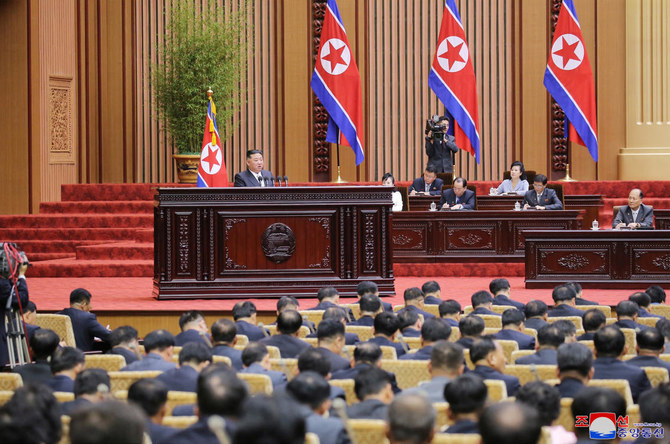
- Move comes as observers say North Korea appears to be preparing to resume nuclear testing for the first time since 2017
- US President Joe Biden’s administration has offered to talk to Kim any time, at any place
Top UN court to rule in Germany ‘genocide’ case over Gaza
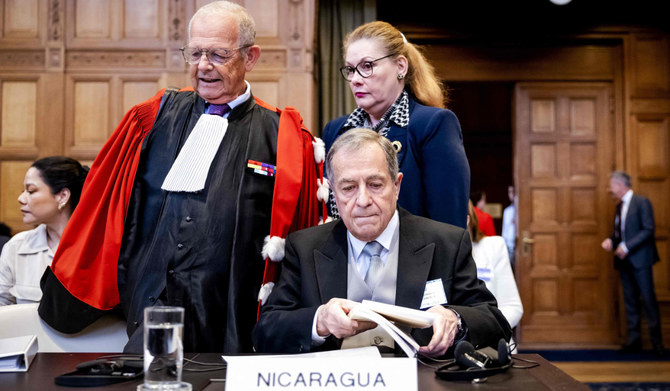
- Israel has killed at least 34,488 people in Gaza, mostly women and children, according to the Hamas-run territory’s health ministry
- Press reports have identified a battalion called the Netzah Yehuda, composed mainly of ultra-Orthodox Jews, as being accused of abuses. It is about 1,000-strong and since 2022 has been stationed in the West Bank, which Israel has occupied since 1967
THE HAGUE: The United Nations’ top court will on Tuesday rule on charges by Nicaragua that Germany is breaching the 1948 Genocide Convention by supplying arms to Israel for the Gaza war.
Nicaragua has hauled Germany before the International Court of Justice (ICJ) to demand that judges impose emergency measures to stop Berlin from providing Israel with weapons and other assistance.
More than 34,000 people have been killed in the Palestinian territory since war broke out in October following a cross-border attack by Hamas that left around 1,170 Israelis dead.
The ICJ in The Hague is scheduled to issue an order at 3:00 p.m. (1300 GMT).
Nicaragua targeted Germany rather than Israel’s main ally, the United States, because Washington did not recognize the ICJ’s jurisdiction in the case, Managua’s lawyers have said.
They say Israel is in breach of the 1948 Genocide Convention.
Top lawyers from the two countries clashed earlier this month at the court, with Nicaragua saying Germany was “pathetic” to be both providing weapons to Israel and aid to Gazans.
Berlin retorted that Israel’s security was at the “core” of its foreign policy and argued that Nicaragua had “grossly distorted” Germany’s supply of military aid to Israel.
“Germany only supplies arms based on a meticulous scrutiny that far exceeds the demands of international law,” said Tania von Uslar-Gleichen, a German representative to the ICJ.
Those supplies are “subject to a continuous evaluation of the situation on the ground,” she added.
“The moment we look closely, Nicaragua’s accusations fall apart,” Christian Tams, another representative for Germany, told the court.
Nicaragua requested five emergency measures, including that Germany “immediately suspend its aid to Israel, in particular its military assistance including military equipment.”
The war began with an unprecedented Hamas attack that resulted in the deaths of about 1,170 people in Israel, according to an AFP tally of Israeli official figures.
Israel vowed to destroy Hamas, with a retaliatory offensive that has killed at least 34,488 people in Gaza, mostly women and children, according to the Hamas-run territory’s health ministry.
Cases relating to the Gaza war brought before the ICJ are closely followed.
In another procedure, South Africa has accused Israel — which like the US is not a member of the court — of perpetuating genocide in the Gaza Strip.
Israel “categorically” denies the South African accusations, which include responsibility for starvation.
In that case, the court called on Israel to do everything in its power to prevent genocide and recently ordered the country to “ensure urgent humanitarian assistance” in Gaza without delay.
Even though ICJ decisions are binding, the court has no mechanism to enforce them.
For example, it ordered Russia to cease its invasion of Ukraine, in vain.
Philippine students are told to stay home as Southeast Asia swelters in prolonged heat wave
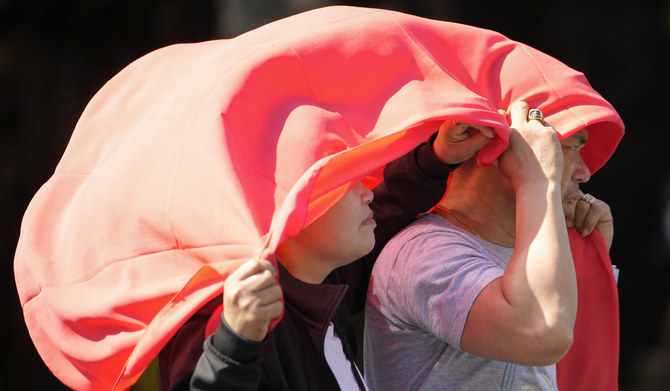
- The Philippines is among the nations worst affected by the sweltering weather in Southeast Asia, where the intense tropical summer heat worsened by humidity forced class cancelations in recent weeks and sparked fears of water shortages, power outages
MANILA, Philippines: Southeast Asia was coping with a weekslong heat wave on Monday as record-high temperatures led to school closings in several countries and urgent health warnings throughout the region.
Millions of students in all public schools across the Philippines were ordered to stay home Monday after authorities canceled in-person classes for two days. The main advice for everyone, everywhere has been to avoid outdoor activities and drink plenty of water, but the young and the elderly were told to be especially careful.
Cambodia this year is facing the highest temperatures in 170 years, Chan Yutha, a spokesperson for the Ministry of Water Resources and Meteorology, told The Associated Press on Monday. His agency has forecast that temperatures in most parts of the country could reach up to 43 degrees Celsius (109 degrees Fahrenheit) this week.
Myanmar’s meteorological department said Monday that seven townships in the central Magway, Mandalay, Sagaing and Bago regions experienced record-high temperatures. Several towns in Myanmar last week were on lists of the hottest spots worldwide.
Chauk township in Magway, historically the country’s hottest region, saw Myanmar’s highest temperature at 48.2 degrees Celsius (118.8 degrees Fahrenheit), breaking the previous record of 47.4 degrees Celsius (117.3 degrees Fahrenheit) set in 1968.
The Philippines is among the nations worst affected by the sweltering weather in Southeast Asia, where the intense tropical summer heat worsened by humidity forced class cancelations in recent weeks and sparked fears of water shortages, power outages and damage to agricultural crops.
The Department of Education ordered students in more than 47,000 public schools to switch to home-based and online learning due to health risks from record-high temperatures and a three-day strike starting Monday by drivers who oppose a government program they fear would remove dilapidated passenger jeepneys from streets.
Large crowds have sought relief in air-conditioned shopping malls in Metropolitan Manila, the congested capital region of more than 14 million people where the temperature soared to 38.8 degrees Celsius (101.84 Fahrenheit) Saturday, surpassing the record set decades ago, according to weather officials.
In Thailand, temperatures have topped 44 C (111 F) in some areas in the northern parts of the country, while the capital Bangkok and metropolitan areas have seen temperatures go above 40 C (104 F). The forecast from the Meteorological Department said this year’s summer, which usually lasts from late February to late May, is expected to be 1-2 degrees hotter than last year, and rainfall will be lower than average.
Thailand’s Department of Disease Control said last week that at least 30 people have died from heatstroke so far this year, compared to 37 for all of last year.
Scientists have said the number of heat-related deaths around the world has been rising significantly in recent years along with temperatures, but the trend in Asia this year so far is unclear, partly because of the question of how to classify deaths that appear to be heat related.
At least 34 people have fallen ill due to the extreme heat in the Philippines so far this year, including six who died. The Department of Health said it was verifying what exactly caused the deaths.
Media in Bangladesh reported that in a five-day period earlier this month, at least 20 people died from heatstroke.
In Cambodia, however, officials indicated there were few if any heat-related fatalities. The Khmer Times, an online news platform, quoted the head of the Health Department of Phnom Penh, the capital, saying there had been no heat-related deaths or collapses.
Israel-Hamas war protesters and police clash on Texas campus, Columbia University begins suspensions
Israel-Hamas war protesters and police clash on Texas campus, Columbia University begins suspensions
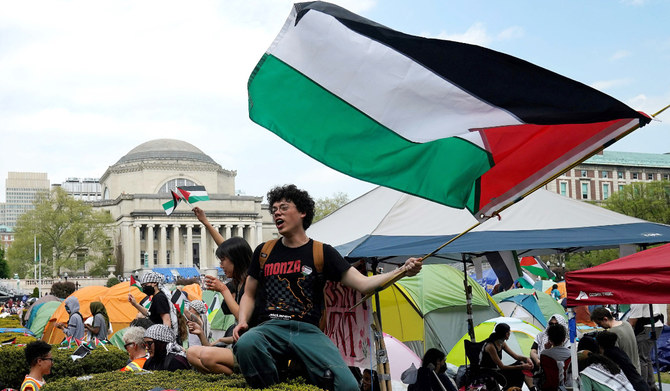
- At Columbia, student activists defied a 2 p.m. deadline to leave an encampment of around 120 tents on the school’s Manhattan campus
- Israel has killed more than 34,000 Palestinians in Gaza, mostly women and children, according to the health ministry in the Hamas-run territory
NEW YORK: Protesters and police clashed Monday at the University of Texas in a confrontation that resulted in dozens of arrests, and Columbia University began issuing suspensions as colleges around the US begged pro-Palestinian demonstrators to clear out tent encampments as commencement ceremonies approach.
From coast to coast, demonstrators are sparring over the Israel-Hamas war and its mounting death toll, and the number of arrests at campuses nationwide is approaching 1,000 as the final days of class wrap up. The outcry is forcing colleges to reckon with their financial ties to Israel, as well as their support for free speech.
The protests have even spread to Europe, with French police removing dozens of students from the Sorbonne university after pro-Palestinian protesters occupied the main courtyard. In Canada, student protest camps have popped up at the University of Ottawa, McGill University in Montreal and the University of British Columbia in Vancouver, The Canadian Press reported.
At the University of Texas at Austin, an attorney said at least 40 demonstrators had been arrested Monday, some of them by officers in riot gear who encircled about 100 sitting protesters, dragging or carrying them out one by one amid screams. Another group of demonstrators trapped police and a van full of arrestees between buildings, creating a mass of bodies pushing and shoving and prompting the officers to use pepper spray and flash-bang devices to clear the crowd.
The confrontation was an escalation on the 50,000-student campus in the state’s capital. On social media, Republican Gov. Greg Abbott reposted video of state troopers arriving, saying “No encampments will be allowed.” Just last week, hundreds of police pushed into protesters at the university, arresting more than 50 people.
The Texas protest and others grew out of Columbia’s early demonstrations that have continued. On Monday, student activists at Columbia defied a 2 p.m. deadline to leave an encampment of around 120 tents on the school’s Manhattan campus. Instead, hundreds of protesters marched around the quad, clapping, chanting and weaving around piles of temporary flooring and green carpeting meant for graduation ceremonies that are supposed to begin next week.
A handful of counter-demonstrators waved Israeli flags, and one held a sign reading, “Where are the anti-Hamas chants?”
The university didn’t call police to roust the demonstrators. But three hours after the deadline passed, school spokesperson Ben Chang said Columbia had begun suspending students. He didn’t indicate how many students were involved. He also didn’t say how the suspensions would be carried out or whether suspended students would be ejected from the campus.
Chang said that while the university appreciated the free speech rights of students, the encampment was a “noisy distraction” that was interfering with teaching and preparation for for final exams. The protests also made some Jewish students deeply uncomfortable, he said.
Protest organizers said they were not aware of any suspensions as of Monday evening.
The notice sent to protesters earlier Monday said if they left by the deadline and signed a form committing to abide by university policies through June 2025, they could finish the semester in good standing. If not, the letter said, they would be suspended, pending further investigation.
College classes are wrapping up for the semester, and campuses are preparing for graduation ceremonies, giving schools an extra incentive to clear encampments. The University of Southern California canceled its main graduation ceremony.
But students dug in their heels at other high-profile universities, with standoffs continuing at Harvard, the University of Pennsylvania, Yale and others.
Protesters at Yale set up a new camp with dozens of tents Sunday, nearly a week after police arrested nearly 50 and cleared a similar one nearby. They were notified by a Yale official that they could face discipline, including suspension, and possible arrest if they continued.
Yale said in a statement Monday that while it supports peaceful protests and freedom of speech, it does not tolerate policy violations such as the encampment. School officials said that the protest is near residential colleges where many students are studying for final exams, and that permission must be granted for groups to hold events and put up structures on campus.
In a rare case, Northwestern University said it reached an agreement with students and faculty who represent the majority of protesters on its campus near Chicago. It allows peaceful demonstrations through the June 1 end of spring classes, requires removal of all tents except one for aid, and restricts the demonstration area to allow only students, faculty and staff unless the university approves otherwise.
At Brown University in Rhode Island, school President Christina H. Paxton offered protest leaders the chance to meet with officials to discuss their arguments for divestment from Israel-linked companies in exchange for ending an encampment.
In the letter to student protesters at Columbia, school officials noted that exams are beginning and graduation is upcoming.
“We urge you to remove the encampment so that we do not deprive your fellow students, their families and friends of this momentous occasion,” the letter said.
The demonstrations have led Columbia to hold remote classes. The school said in an email to students that bringing back police “at this time” would be counterproductive. The university said it will offer an alternative venue for the protests after exams and graduation.
Columbia’s handling of the protests has prompted federal complaints.
A class-action lawsuit on behalf of Jewish students alleges a breach of contract by Columbia, claiming the university failed to maintain a safe learning environment, despite policies and promises. It also challenges the move away from in-person classes and seeks quick court action requiring Columbia to provide security for the students.
Meanwhile, a legal group representing pro-Palestinian students is urging the US Department of Education’s civil rights office to investigate Columbia’s compliance with the Civil Rights Act of 1964 for how they have been treated.
A university spokesperson declined to comment on the complaints.
The plight of students who have been arrested has become a central part of protests, with the students and a growing number of faculty demanding amnesty for protesters. At issue is whether the suspensions and legal records will follow students through their adult lives.
Demonstrators on other campuses, meanwhile, said they would stand firm. Jacob Ginn, a second-year University of North Carolina sociology graduate student, said he had been protesting at the encampment for four days, including negotiations with administrators Friday.
“We are prepared for everything and we will remain here until the university meets our demands and we will remain steadfast and strong in the face of any brutality and repression that they try to attack us with,” Ginn said in reference to a potential police sweep of the encampment.
US President holds separate calls with leaders from Qatar, Egypt over Gaza ceasefire talks

- The danger of a military escalation in Rafah was also stressed, in how it would add catastrophe to an already worsening humanitarian crisis that would impact stability and security in the region, the statement said
CAIRO: Egyptian President Abdel Fattah El-Sisi received a phone call on Monday from US President Joe Biden to discuss the latest developments in negotiations over a ceasefire in Gaza and the dangers of a military escalation in Rafah, a statement from Egypt’s presidency said.
The spokesman for the Egyptian Presidency said the call also touched on the exchange of Israeli hostages for Palestinian prisoners, a main sticking point in any comprehensive ceasefire deal between Hamas and Israel.
A Hamas delegation is currently in Cairo to deliberate on Israel’s response to a ceasefire deal.
The danger of a military escalation in Rafah was also stressed, in how it would add catastrophe to an already worsening humanitarian crisis that would impact stability and security in the region, the statement said.
“President El-Sisi stressed the necessity of full and adequate access to humanitarian aid, reviewing the intensive Egyptian efforts in this regard.
The two presidents also stressed the necessity of working to prevent the expansion of the conflict and reaffirmed the importance of the two-state solution as the means to achieve security, peace, and stability in the region,” the Egyptian presidency statement said.
Biden also held a phone call late on Monday with Qatar’s Emir Sheikh Tamim bin Hamad Al Thani, whose country has also played a role as mediator to the conflict.
“During the call, they discussed developments in the situation in the Gaza Strip and the occupied Palestinian territories, and efforts of the two countries to reach an immediate and permanent ceasefire agreement in Gaza,” Qatar’s Emiri Diwan said in a statement.
India protests separatist slogans allowed at Toronto event
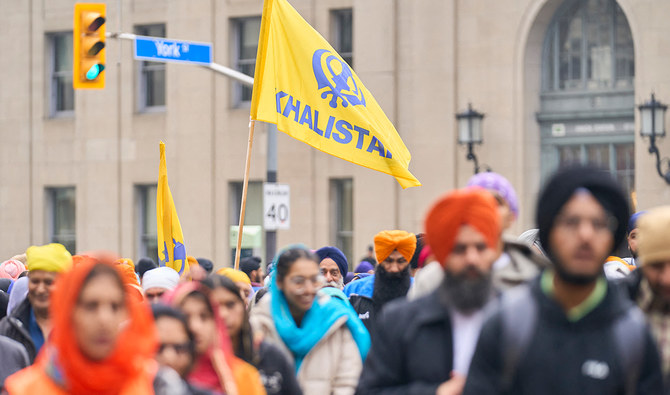
- Bilateral relations soured last year after Canada linked Indian agents to June 2023 murder of its national
- Hardeep Singh Nijjar, 45, was shot dead outside a Sikh temple in Surrey, which has a large Sikh population
NEW DELHI: India summoned the Canadian Deputy High Commissioner on Monday and expressed “deep concern and strong protest” after separatist slogans in support of a Sikh homeland were raised at an event addressed by Prime Minister Justin Trudeau.
Bilateral diplomatic relations soured last year after Trudeau said Canada was “actively pursuing credible allegations” that Indian agents were potentially linked to the June 2023 murder of a Canadian citizen.
Hardeep Singh Nijjar, 45, was shot dead outside a Sikh temple on June 18 in Surrey, a Vancouver suburb with a large Sikh population. Nijjar supported a Sikh homeland in the form of an independent Khalistani state and was designated by India as a “terrorist” in July 2020.
New Delhi has denied any formal government role in Nijjar’s murder.
India’s foreign affairs ministry said on Monday it had conveyed “deep concern and strong protest” at such actions “being allowed to continue unchecked at the event.”
Slogans supporting the rise of a separatist state were raised at an event in Toronto, according to ANI news agency, in which Reuters has a minority stake.
“We will always be there to protect your rights and your freedoms, and we will always defend your community against hatred and discrimination,” ANI reported Trudeau as saying.
Canada has the highest population of Sikhs outside their home state of Punjab in India, and the country has been the scene of many demonstrations that have irked India.
The Canadian foreign ministry did not immediately respond to a request for comment.



